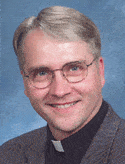CWA Voting Member shares undelivered comments on actions

From the Mark W. Olsen, Director of Admissions, Lutheran Theological Seminary at Gettysburg
Voting Member to the 2009 ELCA Churchwide Assembly from the Metro D.C. Synod
Editor’s Note: At the request of Bishop Graham, Voting Members from the synod who were waiting in line to speak to issues on the floor of the Churchwide Assembly but were unable to do so were invited to share their prepared comments in this forum.

I also rose to speak a third time at the Assembly. This time in support of Ministry Policy Recommendation 4, which “…called upon members to respect the bound consciences of those with whom they disagree; declared intent to allow structured flexibility in decision-making about candidacy and the call process; eliminated the prohibition of rostered service by members in publicly accountable, lifelong, monogamous same-gender relationships; recognized and committed to respect the conviction of members who believe that the ELCA should not call or roster people in committed same-gender relationships; called for development of accountability guidelines; directed that amendments to ministry policy documents be drafted and approved; and stated that this church continue to trust congregations, bishops, synods and others responsible for determining who should be called into public ministry (2009 Churchwide Assembly Letter from Presiding Bishop Hanson, August 22, 2009).” Because the motion was called for and voted on before I was able to speak to it, I was not able to share an important reason I had for supporting this recommendation. I appreciate the chance to do so here.
Had I been able to speak, I would have shared with the Assembly that I, too, have serious concerns about what “structured flexibility” will look like for our church as we look to implement the changes in Ministry Policies being adopted. I, too, have serious concerns for what it will look like when we have new, standard Churchwide policies on these matters that then will have to be applied locally and contextually. I have concerns for the impact these policy changes will have on our ecclesiology; that is, on our life together as one church, lived out in the relationship between its three expressions; congregation, synod, and Churchwide.
However, I would have reminded my fellow Voting Members that we were not going to be able to craft these new Churchwide policies by our trying, as an Assembly, to act as a committee of the whole. We would not be able, in one day, to rewrite our church’s Candidacy Manual, Vision and Expectations document, and Definitions and Guidelines for Discipline. Rather, the recommendation we were voting on required us to trust those church leaders whose task it would be to formulate and develop these new policies on our behalf. And the key word in that last sentence is: trust. We would need to trust them to craft wise and practical policies which would allow the bound consciences of those seeking these changes to be honored and respected while at the same time honoring and respecting the bound consciences of those seeking not to make these changes.
I would have asserted to the Assembly, as I do here and now, that I do trust our church leaders who have been given this immense and sacred task. I trust our presiding bishop; I trust our Church Council; I trust our Conference of Bishops; I trust the women and men of the Churchwide Units with responsibility for these matters. I trust them, in part, because I know a good number of them and I have worked with them. I trust them because they are faithful and faith-filled women and men committed to the offices to which they have been elected or appointed by our church. I trust them because I trust God to guide them, and us, as we move together into the future. I would have encouraged the Assembly to vote in favor or Ministry Policy Recommendation 4, and I would have encouraged them to trust the work these women and men will do on our behalf. I encourage you now to trust them as well.


